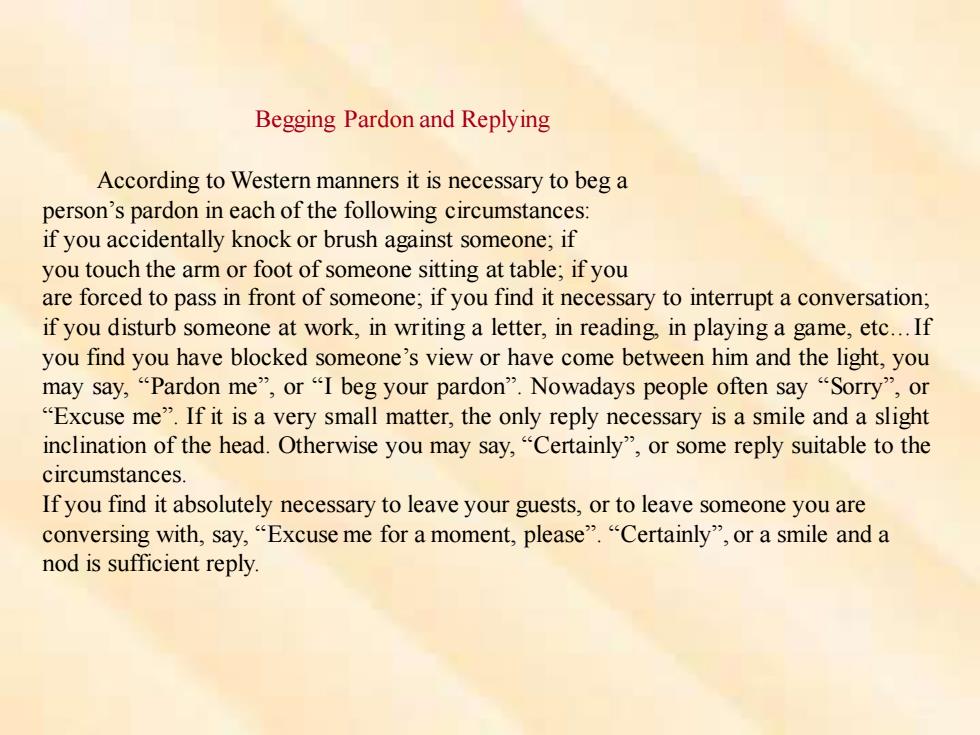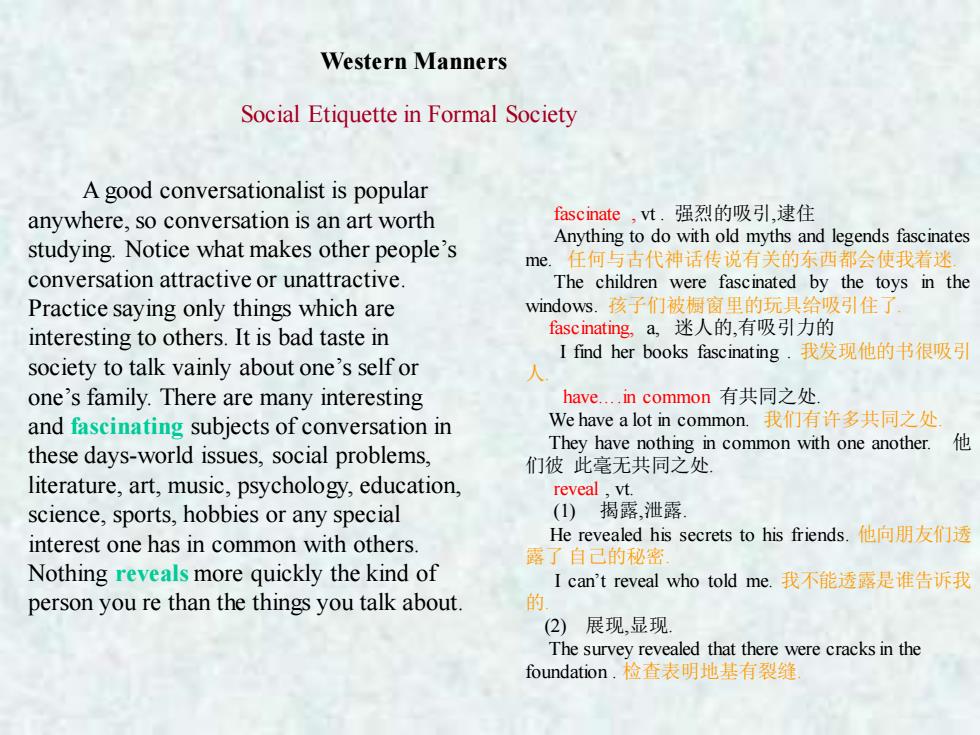
Begging Pardon and Replying According to Western manners it is necessary to beg a person's pardon in each of the following circumstances: if you accidentally knock or brush against someone;if you touch the arm or foot of someone sitting at table;if you are forced to pass in front of someone;if you find it necessary to interrupt a conversation; if you disturb someone at work,in writing a letter,in reading,in playing a game,etc...If you find you have blocked someone's view or have come between him and the light,you may say,,“Pardon me”,or“I beg your pardon'.Nowadays people often say“Sorry”,or "Excuse me".If it is a very small matter,the only reply necessary is a smile and a slight inclination of the head.Otherwise you may say,Certainly",or some reply suitable to the circumstances. If you find it absolutely necessary to leave your guests,or to leave someone you are conversing with,say,“Excuse me for a moment,please”.“Certainly”,or a smile and a nod is sufficient reply
Begging Pardon and Replying According to Western manners it is necessary to beg a person’s pardon in each of the following circumstances: if you accidentally knock or brush against someone; if you touch the arm or foot of someone sitting at table; if you are forced to pass in front of someone; if you find it necessary to interrupt a conversation; if you disturb someone at work, in writing a letter, in reading, in playing a game, etc…If you find you have blocked someone’s view or have come between him and the light, you may say, “Pardon me”, or “I beg your pardon”. Nowadays people often say “Sorry”, or “Excuse me”. If it is a very small matter, the only reply necessary is a smile and a slight inclination of the head. Otherwise you may say, “Certainly”, or some reply suitable to the circumstances. If you find it absolutely necessary to leave your guests, or to leave someone you are conversing with, say, “Excuse me for a moment, please”. “Certainly”, or a smile and a nod is sufficient reply

Text A: Western Manners Social Etiquette in Formal Society A good conversationalist is popular etiquette,n. 礼节,礼仪 anywhere,so conversation is an art worth woth,prep.值..钱,相当于..价值.值得做 studying.Notice what makes other people's The stamp is worth at least 10.000us dollars. 枚邮票至少值1万美元 conversation attractive or unattractive. An old house badly maintained would not be Practice saying only things which are worth spending money on..花钱买一所年久失 interesting to others.It is bad taste in 修的旧房不值得 society to talk vainly about one's self or It isn't worth waiting for him.不值得等候他 practice,v. one's family.There are many interesting ()练习,实习,训练 and fascinating subjects of conversation in I need to practice my English before my business these days-world issues,social problems, tp.出差前我要练习一下英语 (2)从事(职业) literature,art,music,psychology,education, He's practiced law for only a year. science,sports,hobbies or any special 他做律师只有一年 interest one has in common with others. (3)执行 Nothing reveals more quickly the kind of Practice a command.执,行命令 Practice doing sth: person you re than the things you talk about. Every morning I practice speaking English 每天早晨我练习说英语
Text A: Western Manners Social Etiquette in Formal Society A good conversationalist is popular anywhere, so conversation is an art worth studying. Notice what makes other people’s conversation attractive or unattractive. Practice saying only things which are interesting to others. It is bad taste in society to talk vainly about one’s self or one’s family. There are many interesting and fascinating subjects of conversation in these days-world issues, social problems, literature, art, music, psychology, education, science, sports, hobbies or any special interest one has in common with others. Nothing reveals more quickly the kind of person you re than the things you talk about. etiquette , n. 礼节,礼仪 worth , prep . 值….钱,相当于….价值.值得做 The stamp is worth at least 10.000us dollars. 这 枚邮票至少值1万美元. An old house badly maintained would not be worth spending money on. 花钱买一所年久失 修的旧房不值得. It isn’t worth waiting for him. 不值得等候他. practice , v. (1) 练习,实习,训练 I need to practice my English before my business trip. 出差前我要练习一下英语. (2) 从事(职业) He’s practiced law for only a year. 他做律师只有一年. (3) 执行 Practice a command. 执行命令 Practice doing sth: Every morning I practice speaking English. 每天早晨我练习说英语

Western Manners Social Etiquette in Formal Society A good conversationalist is popular anywhere,so conversation is an art worth fascinate,t.强烈的吸引,逮住 studying.Notice what makes other people's Anything to do with old myths and legends fascinates e.任何与古代神话传说有关的东西都会使我着述 conversation attractive or unattractive. The children were fascinated by the toys in the Practice saying only things which are windows. 孩子们被橱窗里的玩具给吸引住了 interesting to others.It is bad taste in fascinating,a,迷人的,有吸引力的 I find her books fascinating.我发现他的书很吸引 society to talk vainly about one's self or one's family.There are many interesting have..in common有共同之处 and fascinating subjects of conversation in We have a lot in common.我们有许多共同之处 They have nothing in common with one another. 他 these days-world issues,social problems, 们彼此毫无共同之处 literature,art,music,psychology,education, reveal,vt. science,sports,hobbies or any special (①)揭露,泄露 interest one has in common with others. He revealed his secrets to his friends.他向朋友们透 露了自己的秘密 Nothing reveals more quickly the kind of Ican't reveal who told me.我不能透露是谁告诉我 person you re than the things you talk about 的 (2)展现,显现 The survey revealed that there were cracks in the foundation.检查表明地基有裂缝
Western Manners Social Etiquette in Formal Society A good conversationalist is popular anywhere, so conversation is an art worth studying. Notice what makes other people’s conversation attractive or unattractive. Practice saying only things which are interesting to others. It is bad taste in society to talk vainly about one’s self or one’s family. There are many interesting and fascinating subjects of conversation in these days-world issues, social problems, literature, art, music, psychology, education, science, sports, hobbies or any special interest one has in common with others. Nothing reveals more quickly the kind of person you re than the things you talk about. fascinate , vt . 强烈的吸引,逮住 Anything to do with old myths and legends fascinates me. 任何与古代神话传说有关的东西都会使我着迷. The children were fascinated by the toys in the windows. 孩子们被橱窗里的玩具给吸引住了. fascinating, a, 迷人的,有吸引力的 I find her books fascinating . 我发现他的书很吸引 人. have….in common 有共同之处. We have a lot in common. 我们有许多共同之处. They have nothing in common with one another. 他 们彼 此毫无共同之处. reveal , vt. (1) 揭露,泄露. He revealed his secrets to his friends. 他向朋友们透 露了 自己的秘密. I can’t reveal who told me. 我不能透露是谁告诉我 的. (2) 展现,显现. The survey revealed that there were cracks in the foundation . 检查表明地基有裂缝